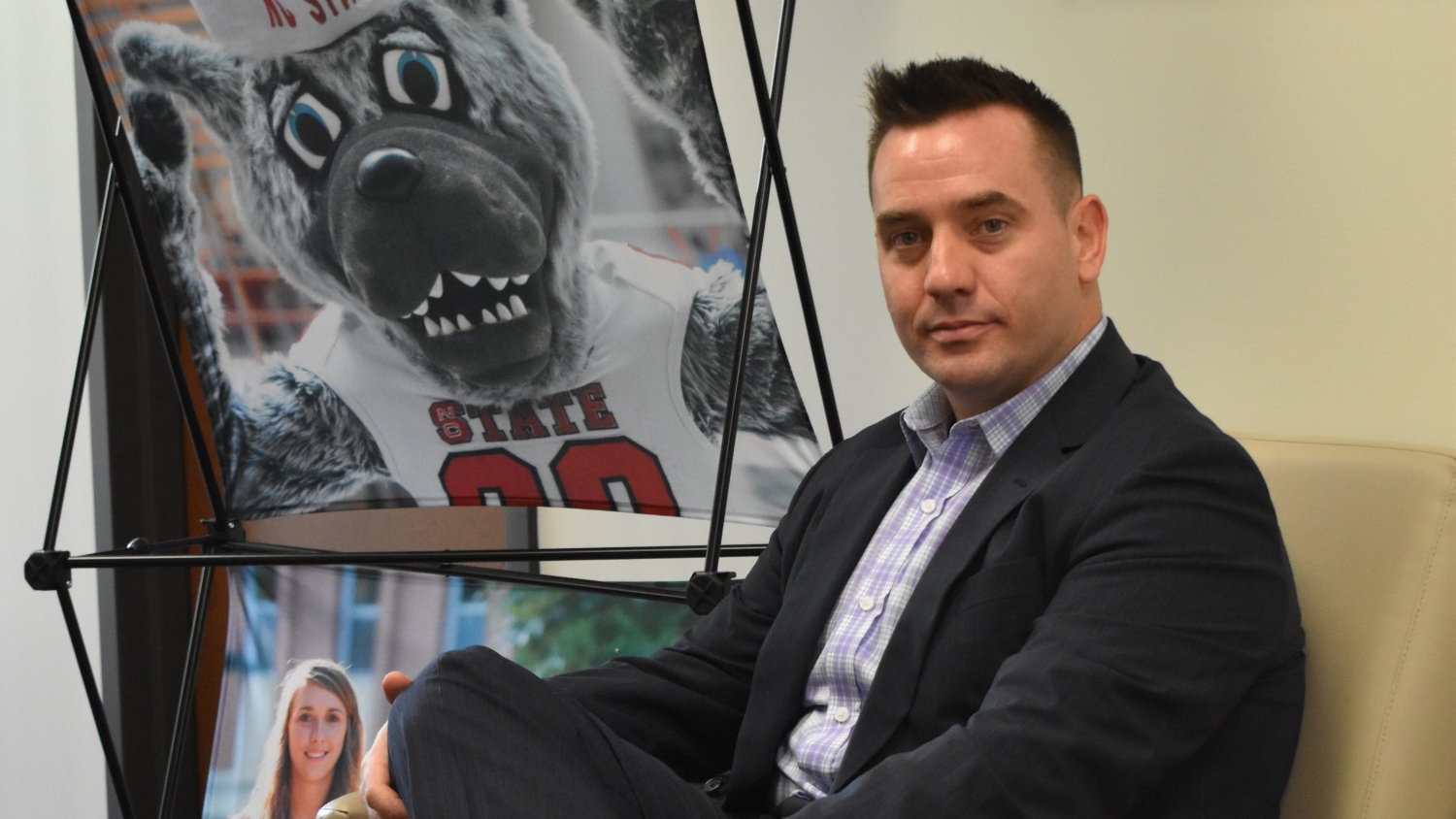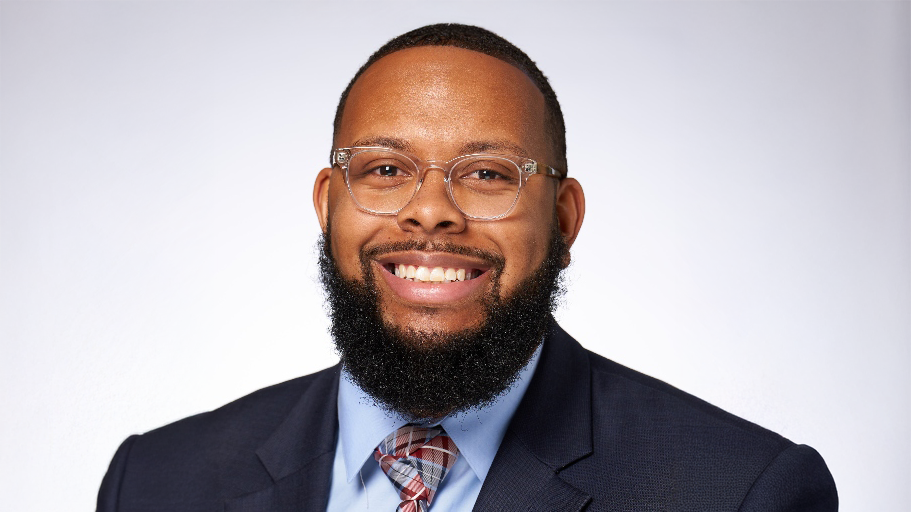The road to Raleigh
In 2003, Morrison graduated from UNC Charlotte with a Master of Accountancy (MAC) degree and spent a few years working as an auditor and a risk management consultant, before coming to a significant realization. “I decided I didn’t want to be in public accounting anymore, and I wanted to join the Navy. I grew up in the military and always wanted to join, but I had a substantial injury history from being an athlete,” he says. While he previously thought his injuries would prevent him from completing the physical requirements of Officer Candidate School (OCS), Morrison made the bold decision to take an entry-level sales job so he could have the flexibility to attend frequent orthopedic specialist appointments to get his body ready for Officer Candidate School (OCS).
In 2007, Morrison completed OCS in Pensacola, FL, and was subsequently selected to join the U.S. Navy Supply Corps based on his business background and personal interest in the field. He describes the Supply Corps as the Navy’s group of logisticians. “We do a lot of the financial management, supply chain management, contract management, and operational logistics that support ships at sea or war fighters in various Areas of Responsibility (AOR),” he says.
Morrison spent six months in Athens, GA at Navy Supply Corps School before being sent to his first assignment in Yokosuka, Japan, where he worked for the Seventh Fleet Ballistic Missile Defense Commander on the USS Shiloh, a guided missile cruiser. He spent 18 months managing the ship’s small retail store, vending machines, laundry, post office, and accounts payable, before transitioning into the role of Food Service Officer, where he worked to locate the Navy’s mobile warehouse ships and coordinate the procurement of the ship’s food supplies.
After two years at sea, Morrison navigated three subsequent roles in the Supply Corp before being presented the opportunity to earn his MBA at NC State: three years at the Navy Supply Systems Command (NAVSUP) in Mechanicsburg, PA, where he was an information technology acquisitions intern and Flag Lieutenant (“executive assistant”) for NAVSUP’s Chief of the Supply Corps; two years in San Diego, CA where he served as the supply officer on another guided missile cruiser, the USS Mobile Bay; and three years as Afloat Training Director at Supply Corps School.

Coming home (to North Carolina)
A year before he moved to Raleigh to earn his MBA, Morrison was selected by a board of senior leaders to be promoted to Lieutenant Commander within the Supply Corps, a role which would require him to obtain a master’s degree in his field. When the Navy’s Civilian Institutions (CIVINS) program selected to earn his MBA from a civilian MBA program by program — an opportunity granted to only a handful of officers each year — he jumped at the opportunity to come to NC State. “The [CIVINS] program selects a group of six people per year group (YG) every year to go out and get MBA’s in the civilian world from top-30 MBA programs. NC State’s program fell within that group of eligible programs, so right away I knew I wanted to come here,” says Morrison, a Mooresville, North Carolina native. “Besides wanting to come home [to North Carolina], the big motivator for me was that my role in the Navy is essentially supply chain management, and there’s not a whole lot of better places to go for that than NC State,” he says.
My role in the Navy is essentially supply chain management, and there’s not a whole lot of better places to go for that than NC State.
After being accepted to NC State’s Jenkins MBA program, Morrison moved to Raleigh in 2017 with his wife, Nadine — a German native he met on his first tour in the western pacific — and their two children, Carly (6) and Don (3). “It didn’t hurt to come home, but the fact that a program with such great stature was here in my home state definitely made a big difference to me. I came here primarily for the supply chain management program, because I want to be the best at what I do. I don’t want to just love it the most, but to be the best at it, too. And I think NC State is equipping me with some of the tools to do that. There’s definitely a lot of work and learning that has to take place on my end, but coming here keeps me on track to be the best I possibly can in my job later on.”
And while Morrison has appreciated being back in his home state, he certainly hasn’t treated it like a vacation. Rather, he’s opted to ensure he gets the most value from the experience as possible. “When I’ve got a job to do, I zero in on it, and I will work my fingers to the bone to figure out how I can do it well and how I can do it the best I can. The job the Navy gave me this time was being a grad student in an MBA program, and I’ve definitely approached my time as a student like a full-time job every single day.”
The value of an NC State MBA
Over the last two years, Morrison has appreciated the opportunity to work with individuals that compliment his skill set and have allowed him to make the most of his time as a student. “One of the things I’ve loved most is how amazing the faculty here are. They teach at such a high level,” he says. “And I’m not talking about teaching super complex things — every school’s program is going to teach very complex thought processes and ideas and concepts. I’m talking about high-level performance. Their ability to make those concepts relatable is tremendous. I have almost 90 hours of graduate education under my belt, and the instructors here are by far the best I’ve seen. There’s no way you get through a class here without learning something. And I’m talking about learning it cold, understanding why it is that way, and how everything around it works, which I think is essential to development and growth from an intellectual perspective.”
Aside from the faculty, Morrison has also benefited tremendously from his fellow classmates, who he says have provided him new perspectives on problem-solving. “When I came here, based on having an undergraduate and master’s degree in accounting, I already spoke the language of business. But a good portion of my peers came from backgrounds in engineering and more statistics and analytics-based backgrounds,” he says. “So the ones with less of a business background are getting the information they need on that front, and at the same time, they’re helping me gain the statistical tools and knowledge to help make better decisions. Getting those tight knit relationships with your peers really lends itself to a more collaborative environment for learning. If you don’t have great instructors, you would have to rely on those collaborative relationships to experience significant growth. But here, we get both. I think that’s pretty amazing.”
Going above and beyond
During his time in Raleigh, Morrison has lived up to his claims of working tirelessly to ensure he’s doing everything possible to maximize his potential.
In his first semester at NC State, Morrison competed in the Merck Grand Business Challenge with three of his classmates. His team placed fourth for their project that focused on how to impose IT security controls on pharmaceutical manufacturing practices, from raw materials to finished goods. “We did extremely well — I was really proud of the job we did,” Morrison says, who, like every task he’s presented with, put full-force effort into the project with his teammates. “We even had matching outfits!”
Over the summer between his first and second year, Morrison worked with the national staff of Consult Your Community (CYC) on proposing changes in their business process in terms of how they queue and sell business to clients.
Coming into his second year, Morrison was selected for the Golden Key Honors Society based on academic performance, and then selected for Beta Gamma Sigma (also for academic performance).
This past spring, Morrison competed in the Leadership and Innovation Showcase to present the model his student team developed for corporate partner, Biogen, which identifies and prioritizes costs of goods sold (CoGS) components for the application of cost control. “It’s an iterative and scalable tool that they’re going to be able to use long-term,” he says of the model, which the company is investing in long-term as a result of its success. “As a result of our research, a Fortune 500 company has authorized additional head count to carry on our work. I think that’s probably the most compelling piece of evidence that our project was extremely successful.”
Back to the field
This summer, with MBA in hand, Morrison will head to Washington, D.C. with his family to apply his new degree and assume his new position as a Lieutenant Commander at Naval Sea Systems Command(NAVSEA), where he’ll serve as on operations officer for a small subset called Acquisition and Commonality. He will focus on business process review for parts purchasing and increasing the commonality of parts across ships to improve functionality and capture greater economies of scale in contracting.
Looking back on his student experience, Morrison says, “I really believe that when you come to an educational opportunity like this, you get more out of it if you put more in to it. So the more time you spend honing those skills, the better they’re going to pay off later on. I’ve spent a lot of time the last two years honing those skills and doing my best to get ready to go back to the Navy.”
Originally published by Adam Tompkins for the Supply Chain Resource Cooperative



